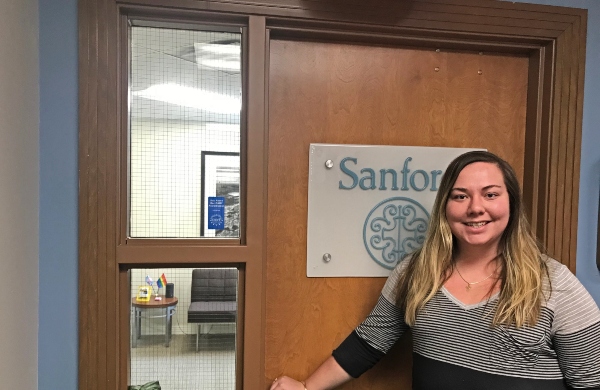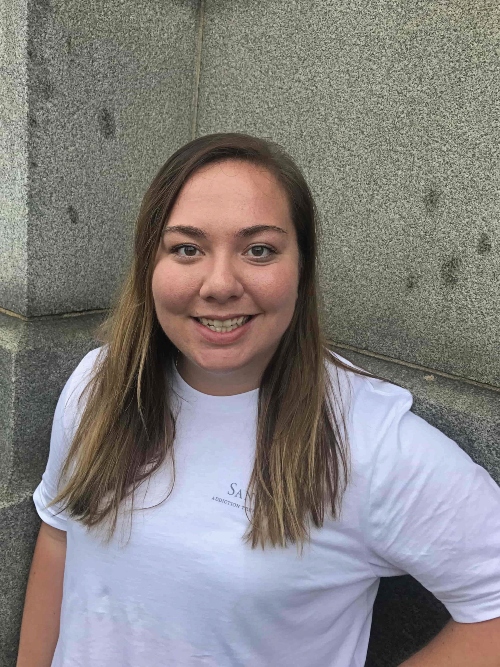Establishing a Safe Space – Limelight Interview

When we talk about establishing a “safe space” in addiction treatment, what does it mean? There is no question that an outpatient facility should be private and secured. But Clinical Therapist, Ellen Sork, says it takes more than that. It is a combination of physical environment, allowing client groups to participate in setting the expectations, and clinicians who care about each other.
It is an honor to hold safe space with our clients and my co-workers. Tough stuff is shared at the Outpatient Center and our clients really are the ones who do the hard work. The people who inhabit this space take care of each other, and it impacts the healing that takes place. Ellen Sork, LLMSW
Sanford Outpatient Center
At Sanford Outpatient Center, our focus is on education, community building and group therapy. Our specialized groups are kept to approximately ten people so that everyone gets the opportunity to be heard. Loved ones are encouraged to participate through family and individual sessions, as successful treatment involves all those who support our clients’ recovery. Outpatient incorporates the following: Intensive Outpatient Program (IOP), Medication Assisted Treatment (MAT), and Outpatient (OP) individual, group, and family therapy as well as aftercare planning.

Ellen on the job – establishing a safe space for healing.
The Limelight Interview: Ellen Sork, LLMSW
1. What is your treatment philosophy?
I look at every person who walks through these doors and think, “You are here for a reason. Let’s run with it.”
2. How do you personalize your work?
I come from a long line of folks in “helping work”. My aunt and my mother are stellar clinicians. My sisters are in helping fields. It’s in my bones, natural and part of my upbringing. My mother is in community mental health, and it’s great that I can talk with her – have her as a sounding board.
3. Is your family history the reason you became a therapist?
I actually love administration. I fell into therapy. My primary area of interest was on a macro level of social work – lobbying, insurance benefits and coverage, administration. But I was advised to start at the micro level – to learn every aspect of the behavioral health field – and I am a people person, so I love it!
4. What are the keys to positive outcomes in treatment and recovery?
First of all, that everyone in the Outpatient Center is on the same page. We meet weekly on housekeeping, policy and case loads, share ideas and updates with one another. We often have people from other areas in the company join us as well. That provides good communication between outpatient, residential and administrative areas of Sanford.
Second, and most important, that we create a space where people believe there is no stigma. That we will deal with their shame or guilt. It sounds like a cliche, but our clients just have to keep coming back. No matter how much they are struggling. Just come back.
Third, that our clients find something outside of themselves. Try stuff. Identify with something they do that can’t be shaken – even by a relapse. Find an identity as a hiker, artist, Christian, crocheter, gardener … go out and do something.
 5. And what are the biggest pitfalls?
5. And what are the biggest pitfalls?
A toxic home environment is a bigger hurdle than what work or support groups can mitigate. Family education and sometimes breaking away from a toxic situation are important. In outpatient we do see relapses. We also see relapse as a learning experience as long as our clients feel comfortable coming back into treatment. We certainly reach out if a client does not make a scheduled group. When they come back, we talk about what went wrong (called an autopsy of relapse). And there is a lot of cheer leading that takes place.
6. What is “fun” about your job?
I love my job. As I said, I’m a people person. It’s a privilege to be here creating a safe space for our clients.
7. What about the challenges?
When people don’t come back. I think about them – our clients float across my mind. I know that everyone is capable of recovery from a substance use disorder (SUD). So, it’s hard if they jump ship. It’s felt by the group too.
Do clients ever just “not work out” in outpatient?
If they do not work out or do not “fit” it is because they are attempting to not fit. At that point we may recommend a higher level of care. But it takes A LOT to get “kicked out” of the Outpatient Program. We are here to help, and very inclusive. We do not give up.
8. Do you read for pleasure? Or is it all treatment all the time?
I am always reading something. In fact it is an important part of my nightly routine. Currently I am reading American Marriage by Tayari Jones. Great book.
9. What makes Sanford unique?
(Without pause) the culture. Everyone here, at every level, is passionate and compassionate about treating SUDs. And our leaders Rae and David Green set the standard.
10. Speaking of setting standards, do you have any go-to phrases you use in group?
If the CHECK ENGINE light is on, don’t keep driving …
11. And finally, what is your most marked characteristic?
I’m a comic. And that carries over into groups. Especially my Early Recovery and Relapse Prevention groups. It’s nice to take time from the heaviness and laugh. Laugh with people.
In your groups what do people grapple with most in early recovery?
Three things. How do I fit in when going back to work? How do I deal with loss? And what are some fun things to do sober? I just suggested to a client he get a sober group together and try golfing. He loves it!
Thanks Ellen. SH



